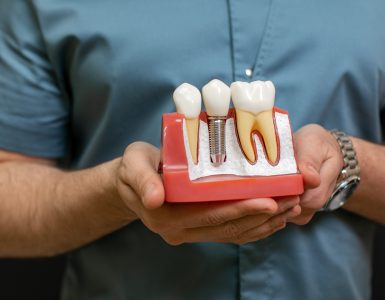Bad breath. Something many of us worry about and most of us will experience at some point in our lives. We are all likely familiar with some causes, namely through eating certain foods, such as onions and garlic, or through smoking and alcohol consumption. You may notice that you suffer from “morning breath” when you first wake up. However, these causes are short-lived and will disappear. It may be that we have persistent bad breath and don’t know that we do, or why we have it.
How can I tell if I have bad breath?
It can be difficult to tell whether you do or not. People may notice, but are too embarrassed to say anything or don’t want to appear rude. Maybe you have noticed people stepping back, or turning their head when you talk to them. There are some methods you can use to check. Cup your hands around your mouth and breathe out through your mouth into them, then immediately inhale through your nose. Alternatively, try licking the back of your hand or the inside of your wrist, wait until it is dry and then smell where you licked.
If you are really concerned, have a quiet word with a close friend or relative who you feel would be honest with you. You could consult with your dentist or doctor for an assessment and professional opinion.
What causes bad breath?
In most cases, bad breath is caused by problems in the mouth, although it can be caused by conditions in other parts of the body. Some contributing factors are:
- Poor oral hygiene. Sulphur-producing bacteria normally live on the surface of the tongue and throat. Tiny bits of food that are trapped in the teeth are broken down by these bacteria releasing a foul-smelling gas. Combined with plaque building up on the teeth and gums, lack of proper dental hygiene can also lead to tooth decay and gum disease, another big contributing factor to bad breath. The crevices in the surface of your tongue can also catch food particles, sulphur compounds and mucus causing bacteria to release an odour. You may notice a white coating on the back of your tongue.
- Mouth infections. Unhealed wounds inside your mouth, an abscess or an ulcer can cause problems. It can also happen after a tooth extraction or wisdom tooth removal when the blood clot that forms is dislodged before the wound heals. This is known as dry socket and can cause significant pain and be accompanied by bad breath.
- Dry mouth. Saliva has an important role in helping to break down food in your mouth. When your salivary glands don’t produce enough saliva, this can cause dry mouth. While there is a small reduction in saliva as we age, dry mouth can be caused by other things such as medication, alcohol, stress or a medical condition.
- Sinusitis and tonsillitis. An infection can cause mucus to drain from your nose down the back of your throat (post-nasal drip) causing bacteria to spread to your mouth.
- Other medical conditions. Conditions such as chronic liver failure, kidney disease, lower respiratory tract infections, cancer and diabetes. Gastric reflux may also cause bad breath.
- Dieting and fasting. When you go on a restricted diet to lose weight quickly, particularly a low carbohydrate diet, when your body breaks down the fat it releases chemicals called ketones that have a strong aroma and can lead to bad breath.
How is it treated?
Treatment will depend on an assessment of the problem. Your dentist will be able to give you a full assessment of your oral health with a thorough check of your teeth and gums. A deep professional clean and any necessary dental treatment may remedy the problem. They will also be able to give you advice on things you can do yourself as part of your oral hygiene routine. If the problem is from elsewhere in your body, your will need to visit your doctor for an assessment of any possible medical conditions, or medications you are taking that could be contributing to the problem.
What can I do to prevent bad breath?
- Practice good oral hygiene, by ensuring that you brush your teeth thoroughly twice daily using a fluoride toothpaste, floss daily and visit your dentist regularly for check-ups and a professional clean.
- Use a tongue cleaner daily to remove the bacteria and clean the back of the tongue. You can use your brush, but a tongue scraper is better at removing the white coating.
- A mouthwash is a good way to remove any remaining bacteria in your mouth and make your breath feel fresh.
- Drink plenty of water to keep yourself well hydrated and prevent your mouth drying out. When we are thirsty, our body does not produce as much saliva, which is a natural cleaner for our mouth. Chewing foods like apples and carrots can help encourage the production of saliva.
- Eating a healthy diet helps to maintain healthy teeth and gums. Avoid sugary and acidic foods and drinks that contribute to the build-up of plaque and bacteria in the mouth. Garlic, onions and spicy foods can also cause bad breath, as can coffee and strong teas.
- Dentures and other dental appliances need to be thoroughly clean daily.
- Quit smoking if you are a smoker. Not only will have huge benefits to the health of your teeth and gums, but it will prevent staining of your teeth and bad breath.
- Chewing sugar free gum helps to increase the production of saliva in your mouth and reduce bad breath.
- Attend your regular dental check-ups.
If you have any concerns with bad breath, contact your dentist. Attending to any dental conditions promptly and having a professional clean will ensure the health of your teeth and gums and eliminate any oral causes of bad breath.




